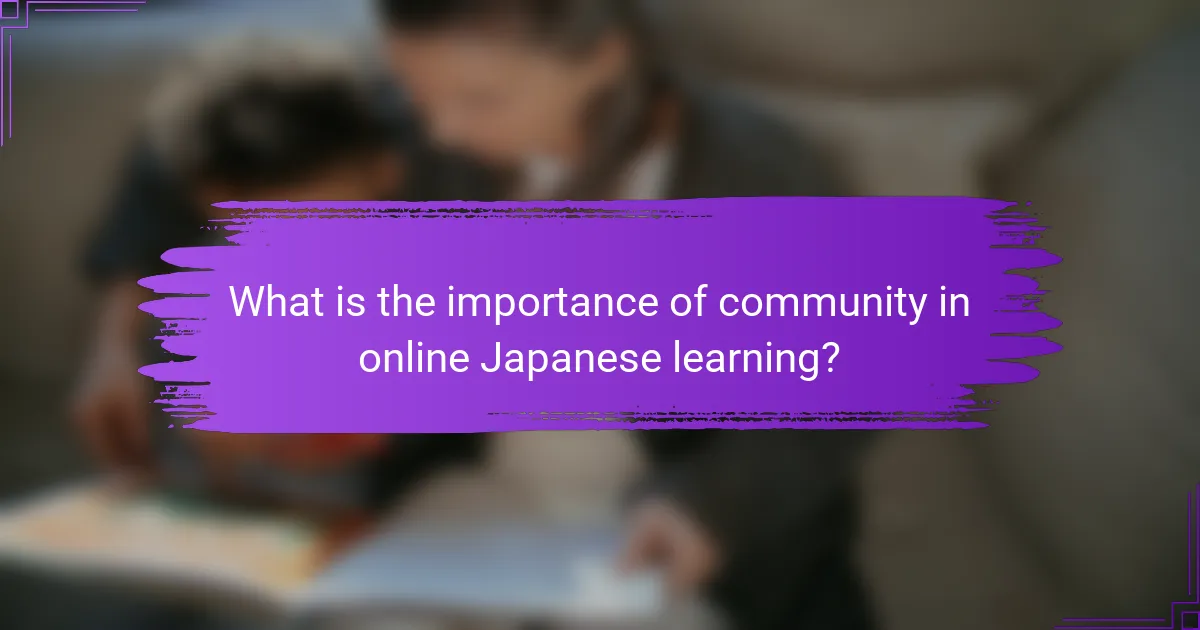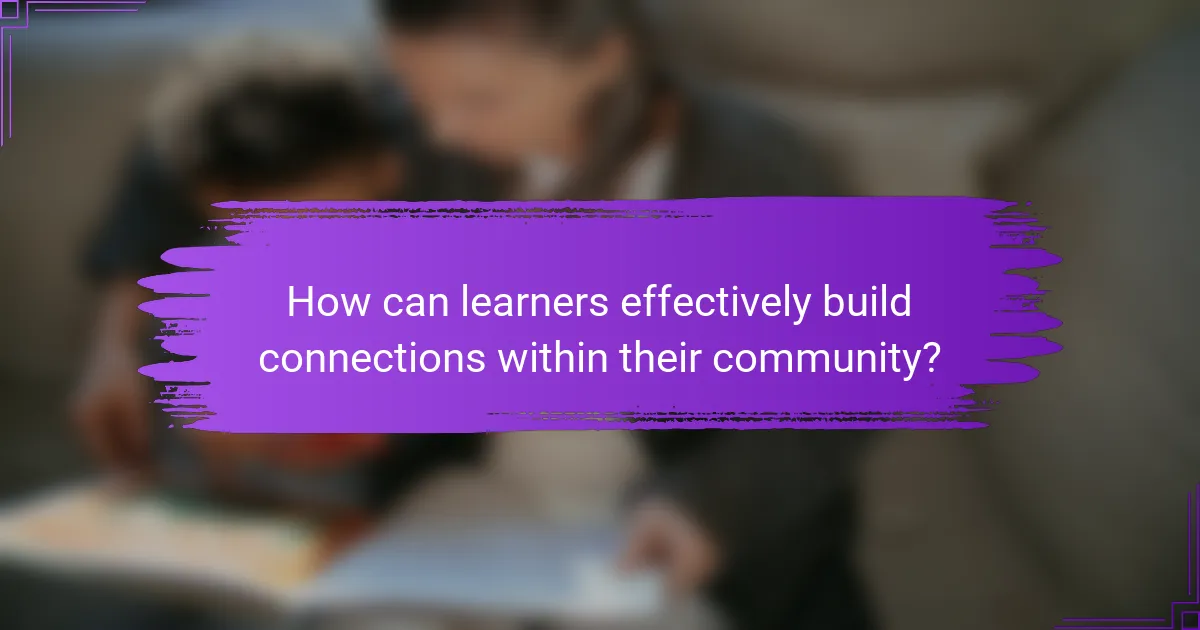
What is the importance of community in online Japanese learning?
Community is crucial in online Japanese learning as it fosters motivation and engagement. A supportive community provides learners with opportunities for practice and feedback. Interaction with peers enhances language retention and understanding. Studies show that learners in collaborative environments perform better. Community also offers emotional support during the learning process. Social connections can reduce feelings of isolation. Engaging with others encourages consistent study habits. Overall, community significantly enhances the online learning experience for Japanese language students.
How does community enhance the online Japanese learning experience?
Community enhances the online Japanese learning experience by providing support, motivation, and opportunities for interaction. Learners can engage with peers, which fosters a sense of belonging. This connection often leads to increased motivation to practice and improve language skills. Collaborative activities, such as group discussions and language exchanges, promote active learning. Research indicates that social interaction can significantly enhance language acquisition. A study published in the “Journal of Language Teaching and Research” found that learners who participate in community-based activities show higher retention rates. Thus, community engagement is integral to effective online Japanese learning.
What are the key elements of a supportive learning community?
Key elements of a supportive learning community include collaboration, communication, and inclusivity. Collaboration fosters teamwork and shared learning experiences. Communication ensures that members can express thoughts and concerns openly. Inclusivity creates a welcoming environment for diverse perspectives. These elements enhance motivation and engagement among learners. Research shows that supportive communities increase retention rates and improve learning outcomes. For instance, a study by Garrison and Anderson (2003) highlights the importance of social presence in online learning environments.
How does interaction within the community facilitate language acquisition?
Interaction within the community facilitates language acquisition through social engagement and practical usage of language skills. Engaging in conversations allows learners to practice speaking and listening in real-time. This interaction promotes contextual understanding of vocabulary and grammar. Additionally, community members provide feedback, which helps refine language skills. Collaborative learning environments encourage sharing of resources and strategies. Studies show that peer interactions enhance motivation and retention of language concepts. Research by Swain (2000) emphasizes the role of collaborative dialogue in language development. Therefore, community interaction is essential for effective language learning.
Why is motivation crucial in online Japanese learning?
Motivation is crucial in online Japanese learning because it drives engagement and persistence. When learners are motivated, they are more likely to complete lessons and practice regularly. This consistent effort leads to better retention of vocabulary and grammar. Research shows that motivated students perform better academically. For instance, a study by Deci and Ryan (2000) highlights that intrinsic motivation enhances learning outcomes. Therefore, motivation serves as a key factor in achieving language proficiency in an online environment.
How does community influence motivation levels among learners?
Community significantly influences motivation levels among learners. A supportive community fosters a sense of belonging. This belonging can enhance learners’ commitment to their studies. Engagement with peers can lead to shared goals and accountability. When learners interact, they often exchange encouragement and resources. Research shows that social interaction increases intrinsic motivation. For example, a study by Deci and Ryan (2000) highlights the role of social support in enhancing motivation. Communities that celebrate achievements can further boost learners’ morale. Overall, a strong community can lead to higher motivation and better learning outcomes.
What role do social connections play in maintaining motivation?
Social connections significantly enhance motivation. They provide emotional support and encouragement. This support helps individuals persist in their goals. Research shows that people with strong social ties are more likely to stay motivated. A study by the American Psychological Association found that social support boosts motivation levels. It highlights the importance of community in learning environments. Engaging with peers fosters a sense of accountability and shared purpose. This connection can lead to increased persistence in challenging tasks.

What types of community structures exist in online Japanese learning?
Online Japanese learning features several community structures. These structures include forums, social media groups, and language exchange platforms. Forums provide a space for learners to ask questions and share resources. Social media groups facilitate real-time discussions and peer support. Language exchange platforms connect learners with native speakers for practice. Each structure fosters interaction and collaboration among learners. These community types enhance motivation and engagement in the learning process.
How can learners engage with online forums and discussion groups?
Learners can engage with online forums and discussion groups by actively participating in conversations. They can post questions and share insights related to their learning experiences. Responding to others’ posts fosters a sense of community. Additionally, learners can contribute to discussions by sharing resources, such as articles or videos. Joining specific interest groups within forums can enhance targeted learning. Regularly checking for updates and participating consistently increases visibility and engagement. According to a study by the Journal of Online Learning and Teaching, active participation in online discussions significantly improves language acquisition. This demonstrates the effectiveness of engagement in enhancing learning outcomes.
What benefits do learners gain from participating in these platforms?
Learners gain enhanced motivation and support from participating in online Japanese learning platforms. These platforms foster a sense of community among learners. This community encourages engagement and collaboration. Learners can share resources and study tips with each other. They also have opportunities for real-time practice with native speakers. Additionally, learners receive constructive feedback on their progress. Studies show that social interaction improves language retention. Engaging with peers can lead to increased accountability in learning goals.
How do peer study groups contribute to effective learning?
Peer study groups enhance effective learning by fostering collaboration and engagement among learners. These groups allow students to share knowledge and clarify concepts with one another. This interaction promotes deeper understanding of the material. Research indicates that students in peer study groups show improved retention of information. A study published in the Journal of Educational Psychology found that collaborative learning increases academic performance by 20%. Additionally, peer study groups provide motivation and accountability, encouraging consistent study habits. This social aspect of learning can reduce feelings of isolation, particularly in online environments. Overall, peer study groups are a powerful tool for enhancing the learning experience.
What online platforms foster community in Japanese learning?
Online platforms that foster community in Japanese learning include HelloTalk, Tandem, and iTalki. HelloTalk connects language learners through text and voice exchanges. Tandem allows users to find language partners for conversation practice. iTalki offers personalized lessons and community discussions. These platforms enhance motivation by promoting interaction among learners. Research shows that community engagement improves language retention and fluency.
Which platforms are most popular among learners?
The most popular platforms among learners are Duolingo, Rosetta Stone, and Memrise. Duolingo offers gamified language learning, making it engaging for users. Rosetta Stone provides immersive experiences that emphasize speaking and listening skills. Memrise focuses on vocabulary building using spaced repetition techniques. According to a 2021 survey by Statista, Duolingo had over 500 million users worldwide. This indicates its widespread popularity among language learners.
How do these platforms support community-building activities?
These platforms support community-building activities by providing interactive features that facilitate engagement. Users can participate in discussion forums, where they share experiences and resources. Live chat functions allow real-time communication among learners. Group projects foster collaboration and teamwork. Events such as virtual language exchanges encourage social interaction. These features create a sense of belonging among users. Research shows that community engagement enhances motivation in language learning. A study by Blin and J. Appel (2019) highlights the positive impact of community on learner persistence and success.

How can learners effectively build connections within their community?
Learners can effectively build connections within their community by actively participating in group activities. Engaging in local events fosters relationships with peers who share similar interests. Joining online forums or social media groups related to Japanese learning enhances interaction. Collaborating on projects or study groups promotes teamwork and communication skills. Volunteering for community initiatives allows learners to meet diverse individuals. Attending language exchange meetups provides opportunities for practice and networking. Research indicates that social interaction significantly boosts motivation in language learning. Studies show that learners who connect with others are more likely to persist in their studies.
What strategies can learners use to connect with others?
Learners can connect with others through various strategies. Participating in online discussion forums fosters communication. Joining social media groups related to Japanese learning encourages interaction. Engaging in language exchange programs allows learners to practice with native speakers. Attending virtual study groups promotes collaborative learning. Utilizing collaborative tools enhances group projects and discussions. Sharing resources and experiences builds a sense of community. These strategies enhance motivation and support in the learning process.
How does sharing resources enhance community engagement?
Sharing resources enhances community engagement by fostering collaboration and building trust among members. When individuals share educational materials, they create a sense of collective ownership. This ownership encourages active participation and strengthens interpersonal connections. Research indicates that communities with shared resources report higher levels of engagement and motivation. For example, a study by McMillan and Chavis (1986) highlights that shared resources lead to increased social interaction. Greater interaction promotes a supportive learning environment. This support is crucial in online Japanese learning, where motivation can fluctuate. Overall, sharing resources cultivates a vibrant community that enhances the overall learning experience.
What are the best practices for initiating conversations with peers?
The best practices for initiating conversations with peers include starting with a friendly greeting. This sets a positive tone for the interaction. Asking open-ended questions encourages dialogue and allows for deeper engagement. Sharing personal experiences can create a sense of connection. Active listening is crucial; it shows respect and interest in the other person’s thoughts. Being mindful of body language, even in virtual settings, helps convey openness. Following up on previous conversations demonstrates genuine interest. These practices foster a supportive community, enhancing motivation in online learning environments. Research shows that social interaction significantly boosts learning outcomes in collaborative settings.
What are the common challenges faced in online learning communities?
Online learning communities face several common challenges. One significant challenge is maintaining student engagement. Research indicates that 70% of online learners report feeling isolated. This isolation can hinder motivation and participation. Another challenge is effective communication among members. Misinterpretations can arise from text-based interactions. Additionally, varying levels of technical skills among learners can create barriers. Some users may struggle with the platforms used for learning. Lastly, the lack of immediate feedback can slow down the learning process. Studies show that timely feedback is essential for student success.
How can learners overcome feelings of isolation?
Learners can overcome feelings of isolation by actively engaging with community resources. Participating in online forums or study groups fosters interaction. Regularly attending virtual classes enhances social connections. Utilizing social media platforms for language exchange builds relationships. Joining clubs or organizations related to Japanese learning provides support. Engaging in collaborative projects encourages teamwork and communication. Research indicates that social interaction improves motivation and reduces feelings of loneliness. A study by the University of Michigan found that social engagement significantly impacts emotional well-being.
What strategies can be implemented to foster inclusivity?
Implementing strategies to foster inclusivity involves creating an environment where all individuals feel valued. One effective strategy is to ensure diverse representation in learning materials. This can include incorporating various cultural perspectives and experiences. Another strategy is to encourage open communication among participants. This allows everyone to share their thoughts and experiences freely. Providing accessible resources is also crucial. This ensures that all learners, regardless of their background, can engage fully. Training facilitators on inclusivity practices can enhance their ability to support diverse learners. Research shows that inclusive environments improve engagement and motivation in learning communities. A study by the National Center for Education Statistics found that inclusive practices lead to higher student satisfaction and retention rates.
What practical tips can enhance community involvement in online Japanese learning?
Encouraging community involvement in online Japanese learning can be enhanced through several practical tips. First, create dedicated online forums for learners to share experiences and resources. This fosters interaction and support among members. Second, organize virtual study groups where learners can practice speaking and writing together. This promotes collaboration and builds confidence. Third, host regular online events, such as language exchange sessions or cultural discussions, to engage participants actively. Fourth, utilize social media platforms to share learning materials and success stories, which can inspire others. Fifth, implement a mentorship program connecting advanced learners with beginners to facilitate guidance and encouragement. These strategies have been shown to increase engagement and motivation among learners.
The main entity of this article is the community in online Japanese learning. The article emphasizes the significance of community in enhancing motivation, engagement, and language acquisition for learners. It explores key elements of a supportive learning community, the role of interaction in facilitating language skills, and the impact of social connections on motivation levels. Additionally, it discusses various community structures and platforms that foster collaboration among learners, as well as strategies to overcome challenges such as isolation and inclusivity. Overall, the article highlights how community involvement is essential for effective online Japanese learning.